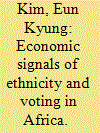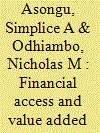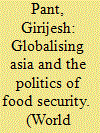| Srl | Item |
| 1 |
ID:
110732


|
|
|
|
|
| Publication |
2011.
|
| Summary/Abstract |
Thermodynamic losses usually take place in machineries used for agricultural activities. Therefore, it is important to identify and quantify the losses in order to devise strategies or policies to reduce them. An exergy analysis is a tool that can identify the losses occurred in any sector. In this study, an analysis has been carried out to estimate energy and exergy consumption of the agricultural sector in Malaysia. Energy and exergy efficiencies have been determined for the devices used in the agricultural sector of Malaysia, where petrol, diesel and fuel oil are used to run the machineries. Energy and exergy flow diagrams for the overall efficiencies of Malaysian agricultural sector are presented as well. The average overall energy and exergy efficiencies of this sector were found to be 22% and 20.728%, respectively, within the period from 1991 to 2009. These figures were found to be lower than those of Norway but higher than Turkey.
|
|
|
|
|
|
|
|
|
|
|
|
|
|
|
|
| 2 |
ID:
176488


|
|
|
|
|
| Summary/Abstract |
The existing literature has demonstrated that both ethnic and economic factors affect a vote decision in African democracies. I show that there is a meaningful interaction between the two cleavages in their influence on voting. In particular, I argue for political salience of agricultural subsectors that shape the electoral consequences of economic performance in the context where agricultural policy affects the livelihood of the majority population. Relying on the analyses of the 2007 and 2013 elections in Kenya, I illustrate how likely an individual, who is attached to a politically coherent ethnic group, votes for a candidate, the majority of whose ethnic members engage in the same industry as the voter himself regardless of the candidate's ethnicity. The results show that the sector factor reinforces the positive and negative effects of ethnic communities on incumbent support, and also explains voting by ethnic minorities whose motives for voting are not ethnic.
|
|
|
|
|
|
|
|
|
|
|
|
|
|
|
|
| 3 |
ID:
186390


|
|
|
|
|
| Summary/Abstract |
This research assesses the importance of financial access on value added in three economic sectors in 25 countries in Sub-Saharan Africa using data for the period 1980–2014. The empirical evidence is based on the Generalized Method of Moments. Financial access is measured with private domestic credit, while the three outcome variables are: value added in the agricultural, manufacturing, and service sectors, respectively. Enhancing financial access does not significantly improve value added in the agricultural and manufacturing sectors, while enhancing financial access improves value added in the service sector. An extended analysis shows that, in order for the positive net incidence of enhancing credit access on value added to the service sector to be maintained, complementary policies are required when domestic credit to the private sector is between 77.50 percent and 98.50 percent of GDP. Policy implications are discussed.
|
|
|
|
|
|
|
|
|
|
|
|
|
|
|
|
| 4 |
ID:
139652


|
|
|
|
|
| Summary/Abstract |
Girijesh Pant examines the implications of a globalising Asia on its food security. He points out the shifting control of the Asian food production system and its consequential vulnerabilities and advocates the decentralised empowerment of food producer to break the hegemony of the new liberal regime. He also suggests that Asian and other developing nations pool resources to achieve food autonomy.
|
|
|
|
|
|
|
|
|
|
|
|
|
|
|
|